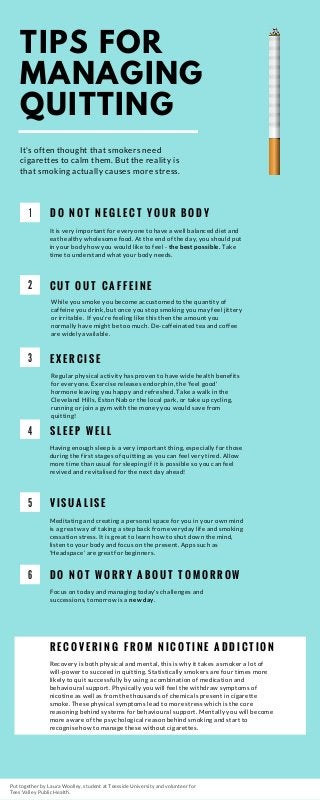
tips for managing quitting
- 1. 1 D O N O T N E G L E C T Y O U R B O D Y It is very important for everyone to have a well balanced diet and eat healthy wholesome food. At the end of the day, you should put in your body how you would like to feel - the best possible. Take time to understand what your body needs. 2 C U T O U T C A F F E I N E While you smoke you become accustomed to the quantity of caffeine you drink, but once you stop smoking you may feel jittery or irritable. If you're feeling like this then the amount you normally have might be too much. De-caffeinated tea and coffee are widely available. 3 E X E R C I S E Regular physical activity has proven to have wide health benefits for everyone. Exercise releases endorphin, the 'feel good' hormone leaving you happy and refreshed. Take a walk in the Cleveland Hills, Eston Nab or the local park, or take up cycling, running or join a gym with the money you would save from quitting! 4 S L E E P W E L L Having enough sleep is a very important thing, especially for those during the first stages of quitting as you can feel very tired. Allow more time than usual for sleeping if it is possible so you can feel revived and revitalised for the next day ahead! 5 V I S U A L I S E Meditating and creating a personal space for you in your own mind is a great way of taking a step back from everyday life and smoking cessation stress. It is great to learn how to shut down the mind, listen to your body and focus on the present. Apps such as 'Headspace' are great for beginners. It's often thought that smokers need cigarettes to calm them. But the reality is that smoking actually causes more stress. D O N O T W O R R Y A B O U T T O M O R R O W Focus on today and managing today's challenges and successions, tomorrow is a new day. R E C O V E R I N G F R O M N I C O T I N E A D D I C T I O N Recovery is both physical and mental, this is why it takes a smoker a lot of will-power to succeed in quitting. Statistically smokers are four times more likely to quit successfully by using a combination of medication and behavioural support. Physically you will feel the withdraw symptoms of nicotine as well as from the thousands of chemicals present in cigarette smoke. These physical symptoms lead to more stress which is the core reasoning behind systems for behavioural support. Mentally you will become more aware of the psychological reason behind smoking and start to recognise how to manage these without cigarettes. Put together by Laura Woolley, student at Teesside University and volunteer for Tees Valley Public Health. 6 TIPS FOR MANAGING QUITTING